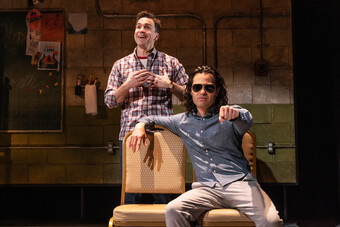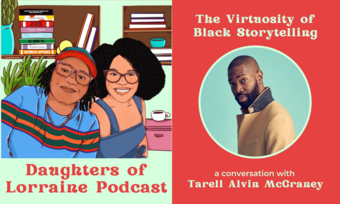Mac Wellman
Pushing Boundaries
I think it’s very social. If you embrace it, it will take you out of your selfishness.—Mac Wellman on theater
When I had just left college and moved back to New York, I had the great fortune of meeting Mac Wellman. He was something of an idol of mine, having read his plays as an undergraduate. I couldn’t believe that he was willing to meet me and talk about theater. We met at Lupe’s, a small Mexican restaurant, one that he still frequents, and talked for a couple of hours. From that day forward, he turned from idol to mentor, as he spurred me in the pursuit of my own work as a director. Over the years I’ve had the chance to direct several of Mac’s plays including Fnu Lnu, The Fez, Description Beggared; or the Allegory of Whiteness, and Bellagio. Each play presents a distinct theatrical world, strange and familiar, odd and funny. His roots in poetry shine through in his carefully selected words that are evocative and playful.
He followed up our initial meeting by introducing me to the producers of the Mac Wellman Festival, and encouraged me to direct his play The Bad Infinity. It was only the second production I had directed professionally. He appeared to have complete faith in me and in the production, which I had decided to present site specifically amidst an exhibition entitled “Wild” at a gallery in SoHo. Not only did he attend, he brought people with him.

Photo by Timothy Keating.
Although Mac does not impose an aesthetic, he encourages less traditional ways of thinking about playmaking, and therefore, many of the playwrights who studied with him write plays that are theatrically adventurous. As Sibyl noted, “He explodes all the boundaries because he is so passionate about changing what a play is in American theater, not even to change what it is but to stop preventing what it could be.”
If you see theater in downtown New York, or a small theater happening in Brooklyn or Queens, there is a good chance you have run into Mac. Usually he’s there before or after the show, introducing playwrights to each other, or to directors, or designers. “You two should know each other,” he often says. “He gets people in touch with the right people,” said his former student Scott Adkins. Mac says it’s less deliberate. “If you introduce people into a culture, they find each other.”
“Theater is a generational activity so you need to identify who you want to work with in your own generation,” asserts Mac. His students have done just that. Many of the members of 13P[1] were taught by Mac and several of his students from Brooklyn College have bandied together to create their own companies and initiatives, which includes publishing each other’s work.
Mac galvanizes playwrights to self-produce because he has witnessed the benefits first hand. The first play he produced was Cleveland and he enlisted Anne Bogart to direct. He believes it was one of the best productions he has ever received and claimed it was more artistically successful than a production he had that same year from a prominent New York theater that cost $90,000. “I find the more money in a production, the less control the artist has. If you produce yourself, you have total control.”
This line of thinking has inspired Young Jean Lee: “The whole culture around Brooklyn College was about putting up little theater. Everybody around me was self-producing. It just never occurred to me to do it any other way.”
However, Mac has also taught writers that have pursued traditional production paths like Annie Baker and Sarah Ruhl. When discussing Annie Baker, Mac acknowledges she is “more accepted by the mainstream” but went on to say that he thinks her plays are “darker and crazier than some of those mainstream people do.”
Regardless of their career paths, the playwrights I interviewed for this article emphasized Mac’s ability to change the way they think about writing a play.
“He extends the limits of what's possible on stage, which was enormously helpful to me…I remember he once had us draw the shape of our play, and said it could be any shape, a zig-zag, a jug, a circle, as opposed to an arc. I'll never forget that,” recounts Ruhl.
Sibyl Kempson said, “He gives you permission to write what you’re going to write.” She also expounded on his almost relentless mentoring and encouragement. After graduating from his program, Mac continued to meet with her and persuaded her to apply for opportunities. Sibyl recounted the time she told Mac she was not going to apply to New Dramatists because she had applied seven years in a row and hadn’t gotten in. He insisted that she apply and that he would write her recommendation letter. That year she got in. Currently, she is writing for some of the most prominent companies in the nation, including Big Dance Theater, Elevator Repair Service, and The Rude Mechanicals.
Although Mac does not impose an aesthetic, he encourages less traditional ways of thinking about playmaking, and therefore, many of the playwrights who studied with him write plays that are theatrically adventurous. As Sibyl noted, “He explodes all the boundaries because he is so passionate about changing what a play is in American theater, not even to change what it is but to stop preventing what it could be.”
In his own plays, he works against theatrical conventions. He believes playwrights go astray when they write the play that they think is going to get them produced.
“Where playwrights go wrong is writing a generic play. Most of these plays have a sofa from which the sofa speech is delivered which sums up the whole play. My play The Left Glove had a sofa. The sofa comes out, with no one in it. It looks around and gets scared and one of the Something Nothing Dancers falls in love with the sofa and begins to stroke it. And the sofa gets very excited. And after a while the sofa goes away and there is no sofa speech. I can look at pictures of plays and know that they’re generic. One clear sign is the sofa. It used to be the kitchen sink. But now Broadway is wealthy.”
Mac’s students have been equally inspired by his essays on theater. Speculations, a post-Aristotelian view of theater, which describes theatrical metaphysics with poetic rigor and humor. The essay distinguishes plot from story and asserts the value of Strangeness in the theatrical experience. It explores a new poetics that shifts its focus away from sentimental narratives, which Wellman refers to as “Geezer Theater.” Young Jean Lee posits that Mac’s own artistic integrity is a key element in making his students feel confident in exploring their own theatrical voices. “He’s pushing boundaries further and further and getting crazier and crazier. Each play is more challenging than the last one, and that’s just so hardcore. That’s what makes the program work, because of the absolute rigor of his aesthetic agenda, and his purity of soul as an artist.”
Several of his students spoke to Mac’s playfulness both in the classroom and in his own work. At the start of class Mac poses a series of questions, illuminating his teaching style: a mixture of think for yourself, trust yourself, and downright playfulness:
- What was the first theatrical experience you ever had?
- What’s the best play ever? What’s your favorite play? And if there is a difference, there is a problem.
- Do you have a mad uncle dressed up in a gorilla suit? Quite a few say yes, and the ones who don’t are lying to me.”
Mac asks these questions so the students can get to know each other. He believes that a sense of community is the most important aspect of a graduate program and contends that because Bohemia no longer exists we have to accept graduate school in its place. The economic realities of being a playwright, however, do resemble Bohemia, and accruing debt as a playwright can put them in a hole they will never get out of, so Mac is working with the CUNY system to institute tuition abatement for playwrights, even though Brooklyn College is one of the least expensive playwriting programs in the country.
Mac’s investment in the next generation of playwrights was stirred by his work editing anthologies. He needed to attend plays in order to make decisions about who should be in the book. Mac had noticed that in 1996 not many contemporary playwrights had been published besides Edward Albee. In his anthology, From the Other Side of the Century, he started with Albee and included such diverse voices as Constance Congdon, Richard Foreman, Naomi Iizuka, and Tony Kushner. In 2006 Mac collaborated with Young Jean Lee on the anthology Downtown Now. When I spoke with Young Jean about working on the anthology, she said Mac curated the plays and she did the administrative work. She commented, “It was a big deal for me, and it was another way of him supporting me actually, to get my name out there. I don’t know if I were asked to edit something, I would give some young playwright co-editing credit when I did all the curating. He knew it wouldn’t hurt him and it would help me, so he brought me on board.”
Mac’s not much into the anthology editing business these days, “Somebody a bit younger should start doing them,” he says. But he stands behind the importance of publications for playwrights as they lead to more possible productions both nationally and internationally.
Although he sees tremendous value in self-producing, he also makes every effort to connect his students with producing theaters. When Young Jean Lee was still his student at Brooklyn College he gave Daniel Aukin (Artistic Director of SoHo Rep at the time) her play, The Appeal. Similarly, he connected Thomas Bradshaw with a workshop at SoHo Rep—both playwrights ended up receiving profiles and recognition from The New Yorker.
Although Mac applauds the efforts to profile playwrights, he is wary of the value of the review to a playwright’s learning curve. In particular, he is disturbed by the current relationship between The New York Times and its relatively recent interest in reviewing every new play in NYC. He remembers when The New York Times paid no attention to work being created by small theaters, and therefore, theater artists paid little attention to the Times’ critics in evaluating their own success or failure around a production. Mac claims, “Gradually that relationship changed to the detriment of new work. It’s nice to get a good review but then if you get one, you want another one and it’s like dope.”
He does think critics can be useful, particularly in bringing in audiences. He shared an example of a critic who served to bolster an entire theater ecology. “My perfect critic was Michael Steele in Minneapolis. You know what he did? He gave everybody a good review. He was discerning about stuff but he never panned anything, so he created a theater culture. It was a deliberate choice on his part to support the theater and make it more energetic and it worked.”
Some of Mac’s students have created community around off the radar performances in an effort to escape the eyes of the critics and feel more freedom in their own creative process. One of these ventures is a party/performance event, Cho-Chiqq, produced annually in the backyard of playwright-couple, Erin Courtney and Scott Adkins’ Brooklyn apartment. There you can see work by Young Jean Lee, Karienne Keithly, Kristin Kosmos, and Heide Schreck, among others. Mac is thrilled by Cho-Chiqq and remarked, “It’s probably more interesting than something I would have designed. I like theaters.”
In fact, Mac says he’s interested in running a theater at some point and is casually investigating the possibility. He would like to be able to produce the plays of the writers for whom he advocates.
When I left my last meeting with Mac, where I had the chance to interview him for this article, I felt curiously optimistic about theater. Although Mac is a skeptic when it comes to institutions (“Be suspicious of institutions; they always tell you who to be and what to do,” he says) he has faith in artists. He has inspired a new generation of theater makers both in his own approach to writing and in his encouragement of writers to pursue their own paths. As Annie Baker said, “I think his students will continue to go out into the world and make theater that is notable for its Mac-inspired-combination of unhinged playfulness and intellectual rigor.”
[1] 13P realizes fully-staged productions of its members' plays. During the production each playwright becomes artistic director of his or her show.














Comments
The article is just the start of the conversation—we want to know what you think about this subject, too! HowlRound is a space for knowledge-sharing, and we welcome spirited, thoughtful, and on-topic dialogue. Find our full comments policy here
I too found this piece very inspiring. It conjured, for me, a happy memory of being a grad school intern at New Dramatists, stage managing a first workshop of CELLOPHANE. Photocopying the script, which was simply a wild text without designating which actors would say what, I was puzzled and perhaps a little skeptical. In the rehearsal room, Mac asked a group of talented actors to read it, and to collaborate with him on deciding which text belonged to each actor. Over a couple of days, characters and a play took shape. Nothing in my training had prepared me for this way of making a play, but the way Mac navigated the process opened my eyes to the magic powers of collaboration. The lovably odd language and the choices of how to shape it were Mac’s, but by his allowing others in the room to “own” it too, CELLOPHANE transformed from a text into a play. Hayley’s terrific article evokes Mac’s special blend of singular artistry and generosity of spirit.
I too am a Mac Wellman fan! He is an extraordinary and generous human being and fellow artist. He too encouraged me to direct and made me feel I could (and trust me, it had never even entered my mind). And he is not just generous with wine an such, which he is also. We were the only 2 playwrights in residence last summer, and Mac was so generous in spirit and friendship and support. I for one would love to see a Mac Wellman run theater, and would frequent it religiously. Loved reading this!!!! Yay, Mac!!!
Thanks for this article, Hayley. It helped me crystallize why Mac has always stood out in my mind as one of the best teacher I ever had. I feel Mac takes fellow artists seriously, even before those artists have the confidence to take themselves seriously. It’s a bold choice to devote one’s life to theatre – to believe people should listen to your stories and give you the resources necessary to tell them. It’s also a choice you have to make before you have much proof that you’re any good. So, when you’re starting out as a theatre artist, you possess a weird combination of enormous arrogance and vulnerability. I feel like Mac treated my fellow grad students and myself with respect that wasn’t based on what we had done, but what we had the potential to do in American theatre. His generosity of spirit is so singular because it is so rare.
A really inspiring article on a man that's maintained his vision and helped utilize this to encourage others to embrace the uniqueness that they have to offer in their own work. It reminds me of when Jose Rivera talks about being your own genre. It's really refreshing to read about someone who has been able to do this throughout their career. What an awesome love letter to theater and to those of us who make up its different facets (Aristotelian or not).
So lovely to be reminded of Mac's vision! I have been thinking a lot about the power and also the stigma of self-producing lately. This was a wonderful reminder to me of the potency of controlling our work and guiding our lives in the theater. Critics, producers funders: they only have power if we cede it to them. Thank you Hayley.
I am supposing that one of the interesting things about art is the many forms that it can take within its various mediums. That certainly goes for theatre as well. Generally I am all for a piece of theatre that can engage me on a feeling level and get me to also think outside the box, or at least nudge, inspire, ignite me to see and consider something from a "fresh" perspective, to take me to a place [perhaps uncomfortable at times] that is unknown territory [on a conscious level] and allow me to roam, explore, engage, and even wrestle with something that has the capacity to expand or deepen my experience and maybe even eventual understanding [or at least appreciation] of life, or aspect of life, or issue. Historically these various forms of theatre are given 'titles' or 'names' to describe their style of structure, intent etc, such as 'Theatre of the Absurd'. I resonate with some more than others. I'll admit I'm not a huge fan of so called 'theatre of the absurd', yet I hold the opinion [along with many other folks in the archives of theatrical opinion] that Ionesco's RHINOCEROSIS is a brillant, noteworthy play. [Will someone PLEASE bring a noteworthy, vibrant revival of it to Off Broadway or Broadway . . . I'm getting tired of revivals of DEATH OF A SALESMAN every five years]. This article on mac Wellman for whatever reason intrigued me [my appology for not being familiar with him or his plays]. I found many of the comments worth contemplating, and several funny. Loved the section about the 'sofa'. I will do all that I can to NOT have a sofa in any play I write within the next year. Actually of the three full length plays I've written none of them have a sofa in them. Thank God! I'm so releived. Although I also believe you can have worthwhile theatre, even noteworthy theatre, that is not necessarily excessively 'generic' with a sofa in it . . . say 'GOD OF CARNAGE'. I am also one who recognizes and appreciates how the oldest form of theatre is 'storytelling', soorytelling with a plot, a purpose, a moral - that is on some level ultimately 'coherent'. My perspective is: you can be divergent, even radical in the "outside the box" way you convey the story, but if it is not basically coherent to most of those receiving and engaging with it, then you've lost or misplaced an important piece of the puzzle for even writing it. It is possible that one's perceived 'artistic integrity' and 'being true to my own voice', can also create 'artistic gibberish'. Not that Mr. Wellman's plays are artistic gibberish, I can't indulge in such a judgment as I've never read or seen any of his plays. I did google the essay mentioned in this article and was able to get through 6 or 7 pages before discontinuing. There was a part of me that was intrigued by what he had written, reminding me of days gone by when I had written down something really 'pity', 'insightful', perhaps even 'profound' after consuming too much really good pot. A few examples: 'Drama takes place in phase space. The continuum of phase-space is to time as time is to space. Theatricality takes place, as it were, perpendicular to time, along the phase-space continuum. The ARISTOTELIAN is the story unfolded as plot. The STRANGE is the story perpendicular to the ARISTOTELIAN which unfolds in phase-space, not in time, and hence cannot be told in terms of plot. (1) One problem with this is that as human beings we experience a strong portion of our reality [through or in time], thus the mechanics of plot assist us to understand and assimilate the phenomenon and intent of story. (2) This 'pithy', supposedly insightful, and nearly incomprehensible example of writing from his essay stirs in me a strong desire to rally for the ARISTOTELIAN camp.
Great story about a theatrical hero!
One of my first experiences as a very young director in NYC was in 2001, when I signed up for one of the playwriting seminars at the Flea taught by Mac Wellman. At that point I was very familiar with his plays. I met some incredible writers, collaborators and friends there and it definitely opened whole new vistas to me.